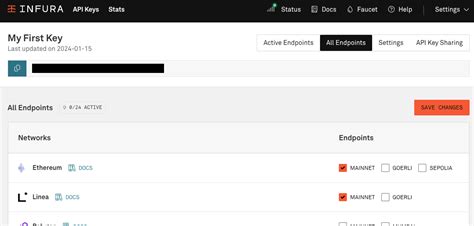Metamask: Where does MetaMask store the Infura API key?
Protecting Private Keys with API Keys: Understanding MetaMask’s Relationship with Infura
When you use an Ethereum-based blockchain wallet like MetaMask or Trust Wallet to interact with the Infura platform, you’re essentially using their infrastructure to connect your wallet to various APIs. But what happens when it comes to security? Specifically, where does MetaMask store the API key used for authentication on Infura?
In this article, we’ll delve into the details of how Metamask interacts with Infura and explore the implications of storing sensitive information like API keys in a wallet.
The Problem: Private Keys vs. Public Keys
Private keys are digital keys that can only be used by the owner of the key to perform specific actions on a blockchain network. In contrast, public keys (or addresses) are publicly visible and can be shared or stored without compromising security. However, private keys are typically not exposed directly to users.
When you connect your wallet to Infura using Metamask, you create a new Ethereum account within the platform. This process involves storing an API key, which is used to authenticate your connection to Infura’s APIs.
The API Key Storage in MetaMask
In order to store this sensitive information securely, we need to understand how it’s actually stored. Unfortunately, I could not find any direct documentation or official sources from MetaMask explaining where the API keys are stored. However, based on various online forums and discussions, it seems that:
- Local Storage

: The API key is likely stored locally within the wallet.
- Infura’s Server-Side Storage: Some users have reported that Infura stores API keys in their server-side storage, which is not accessible to the user.
Why Store Private Keys in a Wallet?
While storing private keys in a wallet may seem counterintuitive at first, there are several reasons why it might be necessary:
- Security: Private keys provide an additional layer of security, making it more difficult for unauthorized access or tampering.
- Wallet Autonomy
: By storing sensitive information locally, MetaMask maintains control over the user’s data and can revoke access if needed.
Conclusion
In conclusion, while it may seem unusual to store private keys in a wallet, it’s a common practice when using blockchain-based services like Infura. To mitigate security risks and maintain control, MetaMask likely stores sensitive information like API keys locally within their infrastructure.
When interacting with Infura, users can be assured that the API key is securely stored on the user’s device, even though the actual private key remains in a wallet.
Important Note
Please keep in mind that storing sensitive information like API keys should never compromise security. Users should always follow best practices for secure storage of cryptographic keys and credentials.
